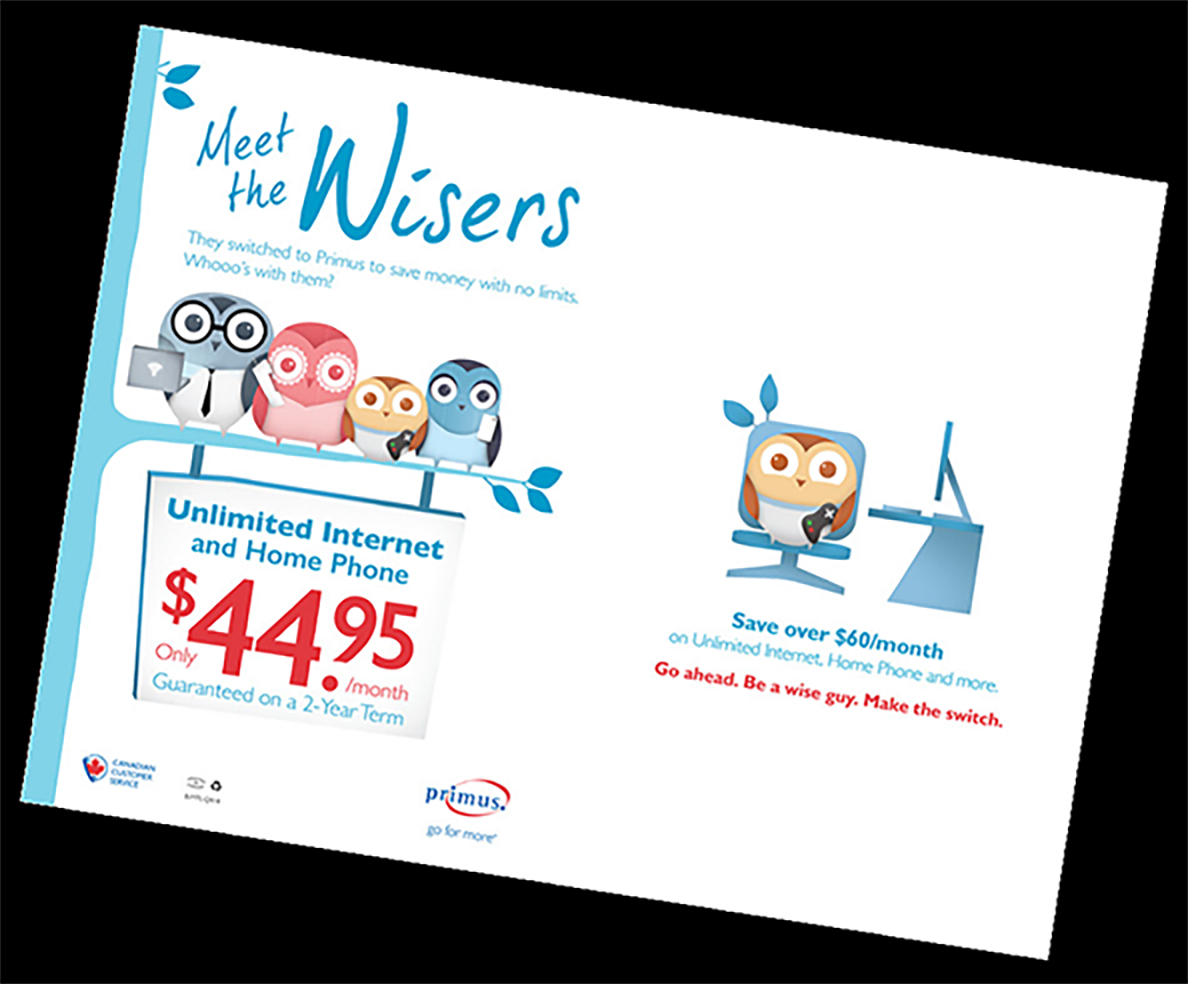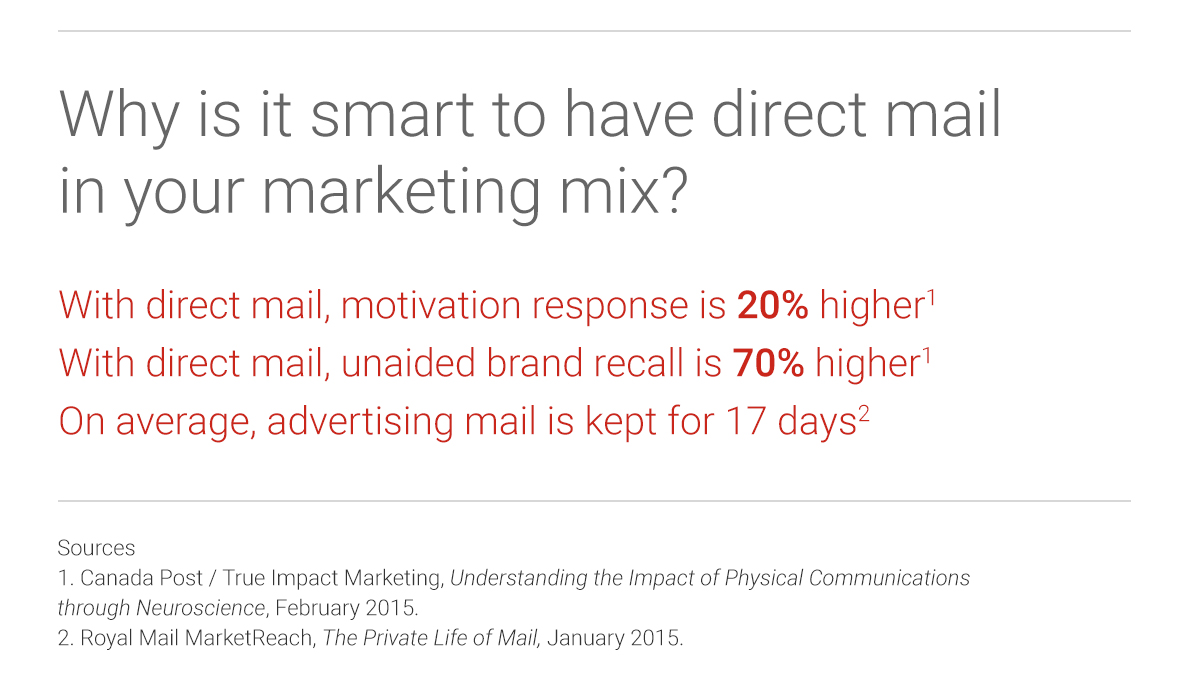It’s been just over two decades since AT&T debuted the world’s first banner ad on a website – with a whopping 44 per cent click through rate! In 2005, Facebook launched its first ad and businesses were thrust into the now essential practice of social media marketing.

The very first banner ad (for AT&T).
But, in the middle of the digital gold rush, older channels survive and even thrive in the marketing mix. Why? For the simple reason that they still work. Direct mail’s average 2016 response rate, for example, was more than five times higher than the best digital channel. And that very first AT&T display ad? Today, according to Google’s 2017 numbers, its click through rate would only be 0.05 per cent.
Direct mail (DM) is one of the true workhorses of marketing. While few marketers may be excited by the idea of producing a flyer or a postcard – can anyone remember the last time a flyer won an award – they’re read by as many as 98 per cent of Canadians. And, when it comes to acquisition, potential customers prefer to receive marketing in the mailbox.
Now that you know direct mail is far from dead, here are four tips for how to make the most of your flyer campaigns – especially when it comes to:
- Reaching millennials
- Getting into condominiums and apartment buildings
- Choosing the right distribution system
- Improving return on investment
1. Reach millennials through their favourite marketing channel
It’s official – the sought-after millennial consumer’s favourite marketing channel is direct mail. At least 75 per cent3 of them read it, share it, and display it. These digital natives are more likely to check a printed flyer than a digital one before heading to the store. And 90 per cent of them trust it to be reliable.
Millennials are both price and value conscious – so you can gain points by highlighting the benefits behind your offer. Beerocracy, a gastropub in a student-rich section of Ottawa, targets students and young professionals in the neighbourhood’s apartment buildings and homes. Their mail piece spotlights value prices on locally sourced food and drink. It integrates with digital by encouraging social sharing through a 10 per cent discount for likes and reviews on social media.
Hint. Use a social share call to action to find out what motivates your customers. A/B test to see whether you get more shares and redemptions with a discount offer to the recipient’s social network rather than to the recipient.
2. More people than ever live in high-rises – here’s how to get your flyers through the glass door
In Canada’s biggest cities – Toronto, Vancouver, Montreal – traditional detached homes are in the minority as the number of high-rise apartments keeps rising. In Toronto, more people now live in high-rises than in detached homes. The upside for businesses is that the same square footage that once held a dozen potential customers can now hold hundreds. The downside is that easy-access door drop off is vanishing.
To reach apartment dwellers, you need to be able to reach their mailboxes – and only Canada Post has access to these mailboxes. You can choose to:
- Have your flyer delivered directly to your target customers’ apartment mailboxes by Canada Post. This way, they stand out as individual pieces, rather than as part of a bundle with other business’ marketing materials.
- Save a little on delivery costs by bundling your marketing piece in with other flyers. This can be done by a company that then contracts delivery into apartments through Canada Post.
Hint. Because apartment buildings often attract similar types of people as residents, they’re a great place to test marketing targeted at different age brackets, family status, income levels and more.
3. What’s the right distribution system to get your flyers into customers’ hands?
Price will always be an important consideration, but beyond that:
- How big a distribution do you need? Do you only need to reach a few blocks? All of Canada? Or somewhere in between? You can deliver flyers in groups of about 500 households, defined by the FSA (the first three characters in a postal code).
- Is it important for your brand that the distributor be trustworthy? That the delivery staff are visibly professional?
If you are targeting across several urban areas, or rural areas, Canada Post has the most complete reach, with delivery to all 15.8 million addresses in Canada, including the 2 million rural addresses that may not be served by other delivery methods. There are several companies, of different size, that deliver flyers in urban and denser suburban areas – although they lack access to the condominiums, apartment buildings and high-rises that make up the majority of residences for Canada’s biggest cities.
If you want to ensure your marketing is delivered by uniformed, trusted professionals, with full access to every mailing address, Canada Post is your best option. If you decide to hire a flyer distributor, do a little online research to see if they have complaints about materials being “dumped”, or very low redemption rates for marketing offers sent via their services. This can indicate that your materials aren’t making it into customers’ hands.
Hint. Sometimes it helps if your message is mixed with your competitor’s in a weekly newspaper bundle. But the “stand-out” value of the mailbox makes sense if you’ve invested in a bigger format, higher quality paper stock, or a virtual add-on.
4. How can I improve the ROI on my flyer marketing campaign?
It makes sense to make your marketing work harder by generating more revenue for each dollar spent. When direct mail flyers are part of the mix, improve your ROI by:
- Integrating your physical campaign and your digital campaigns.
- Aligning your mode of delivery with the investment you’ve made. The flyer for Ikea’s seasonal furniture event often has an augmented reality component – not something that the retailer wants mashed in with a bunch of grocery flyers.
- Zeroing in on the most receptive audience. Layer on customer characteristics like age, income, marital status and more on your delivery area.
Integrate your direct mail and digital marketing channels to improve response rates and message retention. The digital marketing company Salesfusion uses direct mail as a way to stand out, explains Malinda Wilkinson, CMO. “We are over-exposed in the digital world, but it is rare these days to get anything interesting in the mail.” Meaty conversion rates of 10 to 15 per cent mean that Salesfusion will keep using direct mail to bring customers into its sales funnel.
Catherine Walsh, director of media and insights at Best Buy Canada, notes that “Canadians expect their weekly flyers in the mailbox, but also want a digital reference.” On the same day that Best Buy delivers flyers to the majority of Canadian households, it also publishes a copy on its website. Continues Walsh, “We have found that the print and digital versions of our flyer work in strong synergy together.” She points out one of the big changes in the marketing scene, “The customer journey, as we all know, is no longer linear, and has many touchpoints.”
Telecommunications provider Primus Canada faces the challenge of competing with some of Canada’s best known brands – with a much smaller marketing budget. Primus created an acquisition DM piece that combined data overlays, prediction analysis, and attention-grabbing creative (it’s tough to ignore adorable owls). The campaign’s ROI of 578 per cent, well above the 200 per cent target, created so many queries and new customers that the company’s call centre was challenged to keep up.
Stefanie Neheli, the manager of marketing communications at Primus, explains, “The right channel, a disciplined test-and-learn approach, a competitive product, smart analytics, and compelling creative, all combined to deliver the phenomenal success that we saw during this campaign.”

Sources:
3 Canada Post / Harris Decima, Direct Mail Engagement Omnibus, July 2015.
